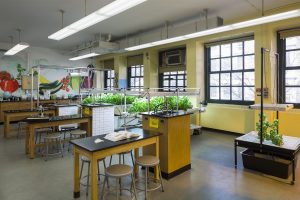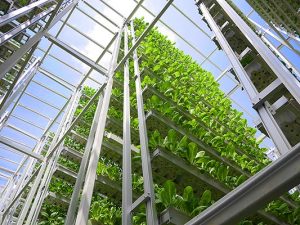November 2, 2017
by Megan Nordgrén

Photo by Ari Burling, courtesy of NY Sun Works
While the federal government currently eschews all mention of climate change, more and more New York City schools are embracing sustainability education. One such opportunity for a solid STEM (Science, Technology, Engineering and Math) program is turning students into urban farmers, as they learn the mandated science standards.
The Greenhouse Project is the brainchild of
New York Sun Works, a small non-profit that builds innovative hydroponics laboratories or state-of-the-art greenhouses in schools. Students learn about sustainable urban farming through project-based learning that emphasizes climate change education. This hands-on approach extends knowledge by connecting concepts such as water resource management, efficient land use, climate change, conservation, contamination, pollution, waste management, and sustainable development.
NY Sun Works’ inaugural project was The Science Barge, a sustainable urban farm prototype and education center on the Hudson River. It was the only fully functioning demonstration of renewable energy supporting sustainable food production in New York City. A second project, the Sun Works Center (PS333), was completed in 2010. It provides K-8th grade students with hands-on exposure to food production paired with rigorous science education. As the first year-round rooftop farm to exist at any New York public school, the Sun Works Center is considered an educational and environmental landmark by the NYC Department of Education and School Construction Authority.
(more…)
May 1, 2016
by Tamanna Virmani

Source: Sky Greens
When you think of New York City, what’s the first image that comes to mind? For people who have visited or live here, maybe it’s one of the following – crowded, dense, lights or skyscrapers – but not “green” and certainly not “farming”. However, that picture may change with the advent of urban vertical farming. So what exactly is vertical farming and how is it different from other concepts such as roof top farming, hydroponics or aquaponics?
Vertical farming is the practice of producing food in vertically stacked layers, inclined surfaces or integrated into other structures, using controlled-environment agriculture (CEA) technology where environmental factors such as light, humidity and temperature can be controlled. The concept of vertical farming in NYC was developed about 15 years ago by Dr. Dickson Despommier, a former public health professor at Columbia University, with contributions from his students. In The Vertical Essay, Dr. Despommier cites that the earth’s population will increase by about
3 billion people by 2050. Currently, over 80% of arable land throughout the world is already in use and another 15% is unusable due to poor land management. That means if traditional farming practices continue, there won’t be enough land to grow food for the expanding population. Vertical farming is a means of maximizing space by growing food inside the tall buildings of an urban environment. In fact, he refers to it as the
third green revolution.
(more…)